It's 8:30 p.m. in São Paulo. Sweat running down their faces, 300 kids have been rehearsing for an hour in a non-air-conditioned warehouse. My head throbs from the deafening sounds of the drums, but I'm enjoying every second of it. The dancers, synchronized in step, have such agility in their feet, it looks like they're floating in the air.
Their director, Flávio Pimenta, makes sure everyone stays focused. Breaks are taken in small groups as the rest of the ensemble continues to rehearse. Not one second is wasted. More importantly, the kids are having fun.
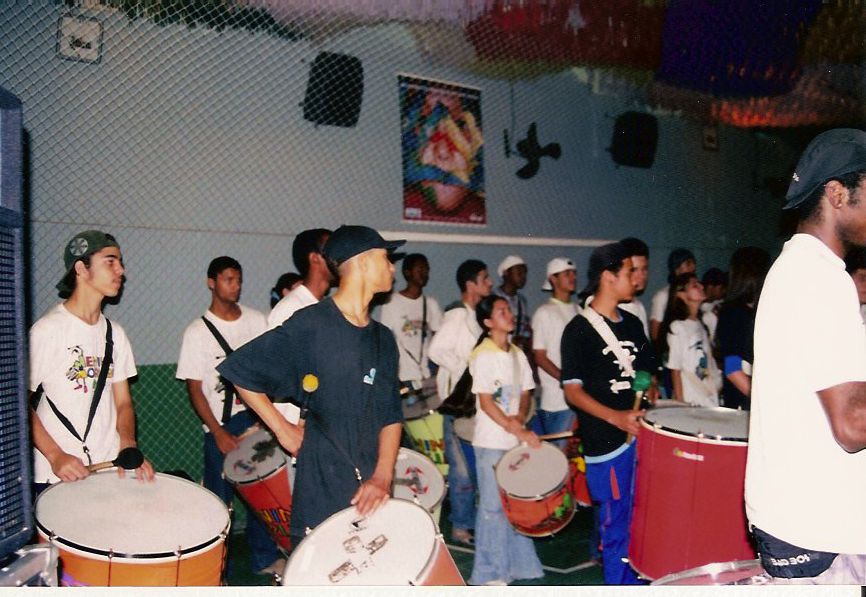
They're called the Meninos do Morumbi, The Children of Morumbi -- and this is a story of survival.
I stumbled upon this group in an issue of Songlines, a world music magazine based in the UK. The small feature highlighted a recent performance with a brief description of the group. Intrigued, I searched the internet, found their website, and contacted their director.
Coincidentally, I was in the final planning stages for a month-long backpacking trip to Brazil. As a music teacher, I often spent my summer vacation traveling the globe visiting and studying with various music ensembles. After several months of correspondence with Flávio, we confirmed a date to visit the school. A week later I arrived in São Paulo where my adventure with Meninos do Morumbi began.
To say Brazil is a beautiful country, is an understatement. Watching the locals dance to the sultry rhythms of the bossa nova as the blue-green waves crash along the beach and the sun disappears behind the hill -- makes Brazil idyllic. Yet, like the rest of the world, she has a less appealing side as well. In the favelas, or slums, gunshots fill the air and gangs, drugs, and teenage pregnancies are of epidemic proportion.
Here, the people's way of life is finding the means to survive another day.
Enter Flávio Pimenta, founder and director of the Meninos do Morumbi Association. A talented and well-versed musician, Flávio studied at various conservatories throughout the country. Prior to his work with Meninos, he founded Drum, the first drumming and percussion school in Brazil.
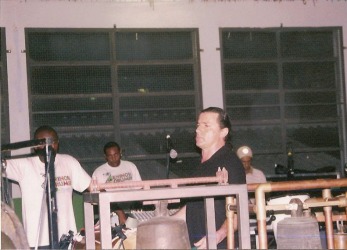
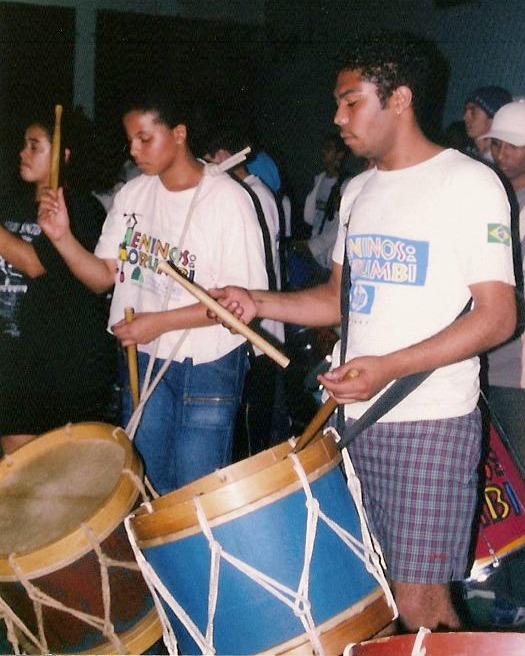
Flávio grew restless as he regularly witnessed children hanging out in the streets, swimming in polluted lakes, and begging for their next meal. He knew that was no life for a child. Believing in the power of music, he offered free music lessons to the kids in the neighborhood. The initial response was overwhelming, but the kids' interest waned soon after, and many returned to their life on the streets.
Frustrated once again, Flávio returned to the drawing board. As he reflected on his own musical experiences during his adolescent years, he remembered the preparations and rehearsals culminating in one final event -- the performance.
Voilà! The youth needed a public performance. They needed to work towards something, rise to the occasion and meet the challenge.
Flávio organized a performance at an annual winter festival located in the small town of Campos de Jordão. With only 30 kids, Meninos performed their first show and it was a success. For the kids, this one moment was the memory of a lifetime.
What followed after this grand event was even more amazing. More shows were booked and other projects within the association began. By 1997, Meninos do Morumbi gained status as a non-profit organization. An organization with focused leaders and a clear-cut agenda -- to foster positive relationships between the association and favela communities, encourage school attendance, provide academic and artistic activities, and strengthen the family network.
As I toured the school the sounds of feet, voices, and drums resonated throughout the halls. Behind each door was a room full of youth, ages 6-19, practicing their instruments. Each class divided by the students' level of ability -- beginner, intermediate, and advanced. Escorted upstairs to the rehearsal area, I was saturated with hugs and kisses -- a welcoming so warm, it felt like family.
The advanced group rehearsed a variety of musical genres from contemporary styles such as samba-rock and funk, to folkloric songs and dances such as maracatu and maculelé. Of particular interest was the group's performance of the jongo, an Afro-Brazilian folk dance introduced by the Bantu slaves of Angola which blended song, dance, and magic. Historically, the jongo was practiced in secrecy among the slaves during Catholic holidays in terreiros, or centers of worship. Performed in a circle of spectators and dancers, the musicians played consecrated drums believed to be the ancestors of the community. The jongueiros, or elder slaves, challenged other's wisdom with songs and ritual lyrics containing spells that often summoned the spirits.
Another delightful performance from the group was the maxixe, or Brazilian tango. Influenced by the lundu, polka, and the habanera; the maxixe is a rapid dance done in 2/4 time. The dance originated in Rio de Janeiro around the 1870s, just about the same time as neighboring countries, Argentina and Uruguay developed the tango.
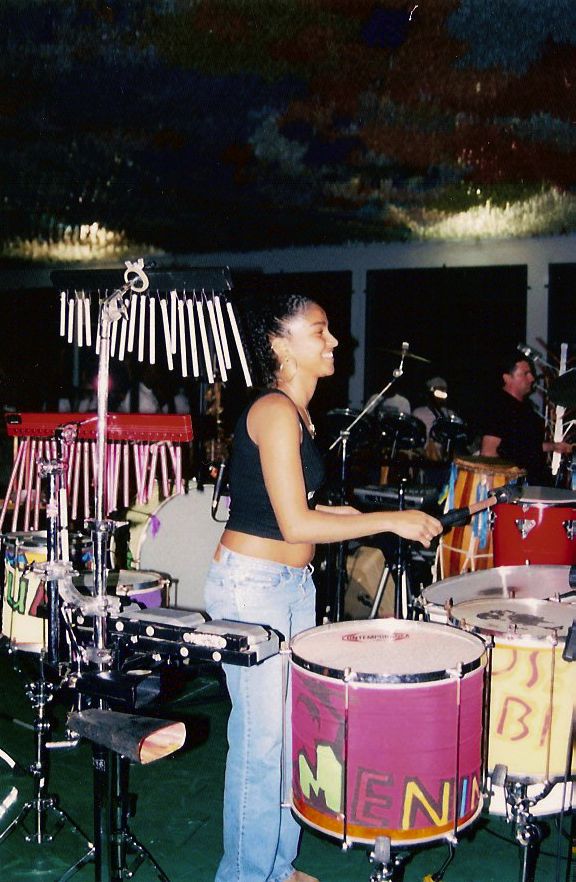
The school's music curriculum is deeply rooted in Brazilian culture with students learning more than just the performance aspects of the music, but the historical and social context in which it was born.
With all this in place, I still wondered how the instructors went about selecting participants.
Flávio's answer was simple -- "no child refused."
Imagine that.
Today, Meninos do Morumbi have performed all over the world and have grown to over 4,000 participants. The student's engage in a variety of activities that support both academic and artistic endeavors. From photography to Jiu-Jitsu, to digital animation and English language class. The list of opportunities is endless.
Tucked away in a quaint São Paulo neighborhood, they've certainly made a name for themselves. Famous and well-known visitors to the group include former British Prime Minister, Tony Blair; jazz singer Neena Freelon; and the drum group, STOMP.
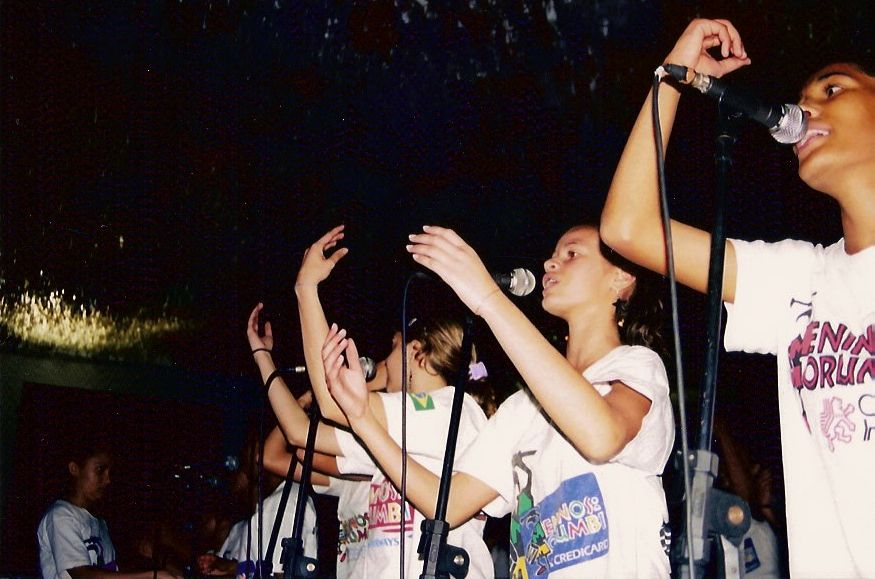
I still get a lump in my throat when I think of that fateful day meeting Meninos do Morumbi. I remember tears running down my face as I tried to film and photograph the group. Tears not of sadness, but of joy for the awesome circumstances that brought me together with them. Flávio Pimenta's kind and generous spirit made all the difference in the lives of these youth. Given opportunity, love, and respect, the youth of Meninos do Morumbi defeated the challenge of survival.
For more information please visit the Meninos do Morumbi here.
